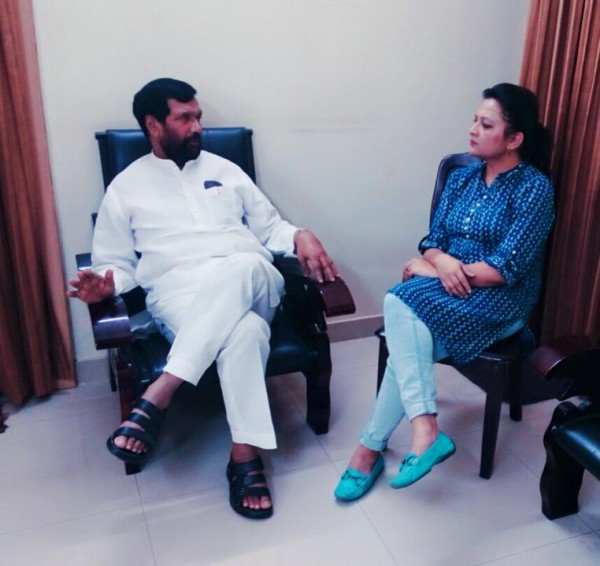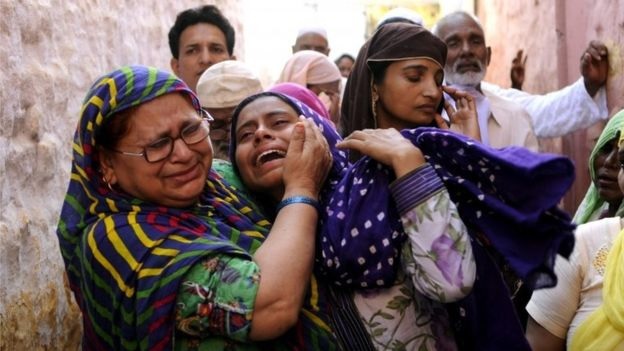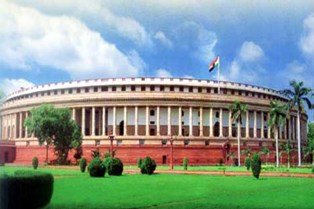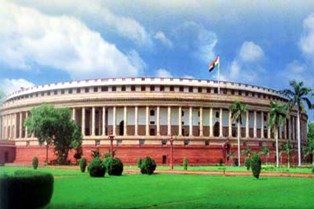
by admin | May 25, 2021 | News, Politics

Amar Singh
Kolkata : In a bid to remain in power and fulfil their interests, the concept of secularism has been used by many political parties in India, Rajya Sabha Member Amar Singh said here on Saturday.
“I think the concept of secularism has been used time to time by many political parties showing no mercy in order to either remain in power or fulfil their interests,” he said speaking at a debate, organised by Indian Chamber of Commerce.
Quoting names of politicians, he said, “I am giving you examples. Present West Bengal Chief Minister Mamata Banerjee was a minister in the Atal Bihari-led NDA government. Now, she is a secularist. Ram Vilas Paswan, who was also a minister in the Vajpayeeji’s government, had left from it protesting the Gujarat riot. Now, he is a minister of Narendra Modi-led government.”
Secularism should not be viewed as appeasement, he said, adding that the present practice of secularism is “distorted” and there is a need to explore the “exact meaning of secularism”.
Secularism calls for brotherhood among people of different communities, he added.
—IANS

by admin | May 25, 2021 | Opinions

Ram Vilas Paswan, Lok Janshakti Party with senior journalist Aarifa Khanam in an Interview on Bihar Political battle
by Syed Zahid Ahmad for Maeeshat
At present state of Bihar has turned into a political crusade and political parties are considering this assembly election as prestige issue. People of Bihar may again ready to cast their votes on the name of religion and caste irrespective of candidates capable to develop their livelihood and state economy. In a state with lower per capita income, we are noticing as if political parties are offering bribes to voters by announcing to distribute laptops, TVs and two wheelers.
Political parties know that the people of Bihar are more curious about speeches on safeguarding their religion and caste values rather than development. The people of Bihar who are really interested in development have either left Bihar for search of better livelihood or have lost their voices in the state campaigns compared to people speaking about secularism or saving religious cultures or schemes for lower castes. So, the political leaders are either condemning opponents or speaking in tone soothing their voters.
Voters should realize that the political parties who promise to distribute materials after winning election are going to make them fool. They should understand that if any particular party wins election; will not pay from its party fund for fulfilling such promises. To fulfill such promise the state Government will obviously increase tax revenues to raise required fund for distribution of materials. Increasing tax revenues will ultimately add tax burden on public. The undesired tax structure would ultimately increase inflation and create adverse conditions for drawing fresh investors in the state. Such fiscal policy will push the state downward instead of increasing potential for state economic growth of Bihar.
In state like Bihar where agriculture often adversely affected by floods, it is required that political parties propose plan to increase income and employment opportunities in industries and services sectors. Micro Small and Medium enterprises (MSMEs) play crucial role to create more income and employment opportunities with lower investments. Access to affordable finance is core requirement to boots MSMEs. But Bihar is worst performing state in terms of credit disbursed by Banks. But so far no party proposes any sound plan in this regard.
It is unfortunate that Bihar despite having third largest population of the country draws lowest per capita credit disbursed by Indian banks. Considering state election, political parties should have raised issue of the lowest per capita credit availed by people of Bihar. Bihar state is getting merely Rs. 6,017 as per capita credit disbursed by Indian banks compared to Rs. 5,48,951 for people of Chandigarh and Rs. 5,04,031 for people living in Delhi. People of Bihar have right to ask why Tamil Nadu is drawing 122% of their deposits as Credits when Bihar is getting merely 33% of their deposits as credits.
While in India overall the number of registered Entrepreneurs Memorandum (EM-II) by MSMEs at DICs has increased by 81% from 2,35,500 in 2010-11 to 4,25,358 by 2014-15; the condition of Bihar state has worsen. In Bihar the number of registered EM-II in 2010-11 were 4,302 which reduced 53% by 2014-15 and recorded as 2,009 only. The rate of decline was highest among micro level enterprises which constitute 81% of MSMEs at India level and 92% at Bihar level. By 2010-11 the Bihar registered 4,267 micro level EM-II MSMEs which reduced to 1,851 by 2014-15. Now how can any state like Bihar develop if 57% micro level MSMEs will be closed down in just four years time? Is any political party proposing any plan for their revivals with suitable financial, technological and market support?
If any party is really serious to help poor people of Bihar, they should propose promoting micro and smaller enterprises in Bihar. Political parties may announce launching of Micro Equity Fund for micro and smaller enterprises allowing them feel equality in financial terms compared to corporate who avail equity from stock markets. Such micro equity funds may allow micro and smaller enterprises boost their entrepreneurship; ultimately boosting manufacturing activities in the state. This may put Bihar in higher growth trajectory despite all poitics.
Now who will let the people of Bihar visualize a developed Bihar? Truly speaking it depends on people of Bihar who have to cast their votes for assuring development of Bihar and not for the sake of religion and caste. Useless to condemn political parties; people of Bihar should apply their minds while casting votes for Bihar election.
Mr. Zahid can be reached– economicinitiatives@gmail.com)

by admin | May 25, 2021 | News

Family Members of Akhlaq (Photo Credit BBC)
By Abdul Bari Masoud,
New Delhi: Political parties and Muslim groups have condemned the lynching incident of Muslim man and his son in UP’s Bisada village in the strongest possible words as the incident has sparked outrage in the country. They alleged that such incidents are a result of the “climate of hate” propagated under BJP to polarize people and these are bound to increase in the run-up to the Bihar elections. .
A strong mob of 200 persons attacked the residence of Mohammad Akhlaq in Bisada village near Dadri, Uttar Pradesh after an announcement was allegedly made from a temple that a cow has been slaughtered at his house. The mob allegedly beat 50-year-old Akhlaq to death while his son Danish was critically injured in the attack.
Reacting to the gruesome incident, Congress on Wednesday said there are no words to condemn this dastardly act. Briefing the media here, Congress Spokesperson Dr. Abhishek Manu Singhvi said in the last 15 months since the BJP came to power, communal incidents have been spiraling in the various part of the country. He warned that such incidents have been tarnishing the image of the country in the world.
Taking a dig at the Prime Minister without mentioning his name, Dr Singhvi said the greatest orator of the country has adopted stunning silence on these incidents and saber-rattling from his party members.
“What is most disturbing is the silence at the top, the silence from India’s greatest orator who can have an effect or counter-effect on such tendencies – that silence is absolute eloquent, it is stunning and it is most deplorable”. In response to a question that VHP leader Ashok Singhal has once again raked up the issue of Ram Mandir, and further asked if this will escalate during Bihar Assembly Elections, Dr. Singhvi said he has made the point by reference to this growing ambivalence and climate and he referred to last two weeks only from Ranchi on 16, 17, 26 and 27th September to Gonda in UP to Jamshedpur in July August etc.
“To that the list which can be added is endless – there is Adityanath, Swamy, Sadhvi and there is another statement – the VHP statement – the question is not the manifestations of such people, the question is why is this climate growing so innumerably and immeasurably in less than 15 months, he added. Party spokesperson said such statements reflect a ‘gutter’ level mentality adding that these incidents for whatever weird reasons are bound to increase in the run-up to the Bihar elections.
“This politics of divisiveness, this politics of poison, this politics of mutual hatred and disgust, this politics of trust-deficit , unfortunately there is only one segment in this country who reflects this philosophy, who thinks like this and who has no compulsion or hesitation in trying to en-cash such thoughts and feelings in the run-up to the elections”.
The CPI (M) also condemned the lynching incident demanding the Samajwadi Party government to crack down on those behind the “motivated” attack.
In a statement, CPI (M) said: “The government has to crack down against all those indulging in such communal propaganda. Police must uncover the culprits behind this motivated attack and take firm action to apprehend the guilty and bring them to justice”. It blamed the sustained communal campaign launched by Hindutva outfits against cow slaughter and beef consumption for the horrible incident. It further said the provocative statements being made by Union ministers and various BJP leaders have vitiated the communal atmosphere in the country.
The CPI (M) has urged the people to be vigilant about such provocations and rebuff the designs of those fomenting violence by maintaining communal peace and harmony.
Muslim groups also came down heavily on the BJP government as well as UP’s Akhlesh Singh Yadav government for rising atrocities on the minority comminutes.
All India Milli Council said since the BJP came to power, the country has been pushed into communal cauldron. Council secretary general Dr Manzoor Alam said the brutal lynching of Mohammad Akhlaq in Dadri on the pretext of cow slaughtering and killing a Muslim youth in Maharajganj (Kanpur) by dubbing him a terrorist are the most reprehensible and despicable act. He alleged that there is nexus between BJP and SP for vitiating the communal atmosphere in the country for the petty political gain. He said what happened in Ranchi and other places are a grim reminder that the country is heading toward right-wing extremism and militancy. He asked the National Human Rights Commission, the National Minorities Commission and UP State Minorities commission to probe into the incident.
Jamait-e-Uelma Hind (Mahmood) has demanded an inquiry into the incident. Jamait general secretary and ex MP Maulana Mahmood Madani criticized both BJP and SP for failing to check communal elements. He said after BJP’s coming to power at the Center, a new wave of communal riots has started in the country. He also accused the UP government of not taking any action against culprits of communal violence as the state witnessed an increase in riots since the SP came to power in UP.

by admin | May 25, 2021 | Corporate, Corporate Governance
 By Brajendra Nath Singh
By Brajendra Nath Singh
New Delhi:(IANS) The Union government will convene a special session of parliament to pass the goods and services tax (GST) bill – a constitutional amendment – only after a consensus is achieved among all political parties, including the Congress and the Left that are vociferously opposing the measure, official sources said.
The GST bill intends to create a harmonised system of taxation by subsuming all indirect taxes under one tax.
Government negotiators have reached out to Congress president Sonia Gandhi, vice president Rahul Gandhi and Leader of Opposition in Rajya Sabha Ghulam Nabi Azad, but the outcome is not encouraging as Rahul Gandhi is still adamant on not supporting the bill till the party’s demands are met and changes accordingly made in the bill.
Finance Minister Arun Jaitley, Parliamentary Affairs Minister M. Venkaiah Naidu and Minister of State for Parliamentary Affairs Mukhtar Abbas Naqvi are talking to all political parties to reach a consensus on GST.
According to government sources, most of the parties are in favour of GST but the Congress and Left parties are still adamant on their stand. However, Samajwadi Party and the Trinamool Congress have conveyed to the government that they will support the bill only after a broader consensus on the issue.
The SP has 15 and TMC has 12 members in Rajya Sabha, where the Congress has 68 members and the NDA 63, including the BJP’s 44. The government requires the support of at least 163 members of the 245-member house to pass a constitution amendment bill.
There is a group in Congress party which is arrogant and whose imprudence on GST has created confusion. But we are still confident. In coming days, the bill will be passed, Naqvi told IANS.
Congress was also committed to GST and their only demand was that the bill be referred to a select committee which was met. The select committee has now submitted its report. The Congress should fulfill its commitment, he added.
Despite the government’s confidence, it has few options for passing the bill.
A constitution amendment bill can be introduced in either house of parliament and has to be passed by each house by a two-thirds majority of members present and voting.
GST is a constitution amendment bill. There is no provision for bringing a constitutional amendment through an ordinance or a joint sitting of the house. It must be passed by both houses of parliament. There is no other way to pass a constitution amendment bill,” constitution expert and former Lok Sabha secretary general Subhash Kashyap told IANS
To explore the possibility of passing the GST bill, the Cabinet Committee on Parliamentary Affairs had decided against immediate proroging of the houses when parliament’s monsoon session was adjourned sine die Aug 13.
The sources said the decision to reconvene the monsoon session would depend on the progress the government makes in getting the support of opposition parties on the GST Bill in the Rajya Sabha.
The task before the government is to pass the bill in Rajya Sabha where it lacks majority.
The GST, Constitution (122nd Amendment) Bill, 2014 was introduced in Lok Sabha on December 19, 2014, which passed it on May 6, 2015. It was referred to a select committee of Rajya Sabha on May 14, 2015.
The bill was introduced in the upper house on the penultimate day of the monsoon session after the select committee of presented its report.
Since certain changess are expected in the bill that the Lok Sabha passed, the bill will have to be again passed by the lower house once it clears the Rajya Sabha.
Naqvi said that the government definitely lacked numbers in Rajya Sabha, but as far as the GST is concerned, the numbers are positively in its favour. The government is talking to all the stakeholders with a positive mindset so that the new tax regime can be rolled out from its current deadline of April 1, 2016, the current deadline, added Naqvi.
Once it clears parliament, the bill will have to be ratified by 17 state assemblies before it is sent to the president for his assent.
Naqvi also took a dig at Rahul Gandhi for Congress party’s opposition to GST.
Somebodys aggression should not stall the progress of the country. Trying to throw a spanner in the countrys growth story is not aggression. It will boomerang on those people who are trying to stall the progress of the country, Naqvi said, without naming Rahul Gandhi.
Parliament and state legislatures will have concurrent powers to make laws on GST but only the centre may levy an integrated GST (IGST) on the interstate supply of goods and services and imports.
(Brajendra Nath Singh can be contacted at brajendra.s@ians.in)

by admin | May 25, 2021 | News

Yogendra Yadav
New Delhi: The Muslim minority politics wants a change today but so-called secular parties don’t as they have made them bonded labor and take them for granted at the time of elections; It is you the youth who should decide for a new leadership, said dissident Aam Aadmi Party leader Yogendra Yadav while addressing a gathering of Muslim youths in Jamia Nagar area of Delhi on Wednesday.
“For first 50 years after Independence, Muslims did not vote for Muslim parties but the so-called secular parties took this loyalty as a bond and they started to use them as bonded labourer. They create fear psychosis among Muslims and take their votes. They did not take up the real issues of Muslims, rather held them around two-three issues like Shah Bano, Urdu and Aligarh Muslim University,” said Yadav at the program organized by Students Islamic Organisation of India.
He also blamed the traditional leadership of Muslims for the bonded-labor relations between the community and secular parties. He also said that political parties imposed leadership on Muslim society.
Without mentioning the dispute within AAP in the recent months that has disappointed many Delhi voters, Yogendra Yadav said “VP Singh had once become a hope for Muslims and in the last 2-3 years, the community took Aam Aadmi Party with the same enthusiasm, but at this time I would not speak about how much of the hope is intact today.”
Yadav also criticized the politics of Majlis Ittehadul Muslimeen. He said “MIM’s politics is dangerous for Muslims but it is perfect for BJP and such parties.”
“You the young leaders should decide for a new leadership (in the Muslim community). I took up the issue while talking to Muslim intellectuals in Bangalore and will raise it Hyderabad next month,” he said.
He advised Muslim youths not to get angry over problems and discriminations. “You need not angry over problems. Rather you should think about issues seriously and chalk out a plan for next 50 years,” said Yadav who launched Swaraj Abhiyan last month in a bid to reform the AAP.
He and Prashant Bhushan, both founder members of AAP, have however been sacked from all party positions by AAP national convenor and Delhi chief minister Arvind Kejriwal.






